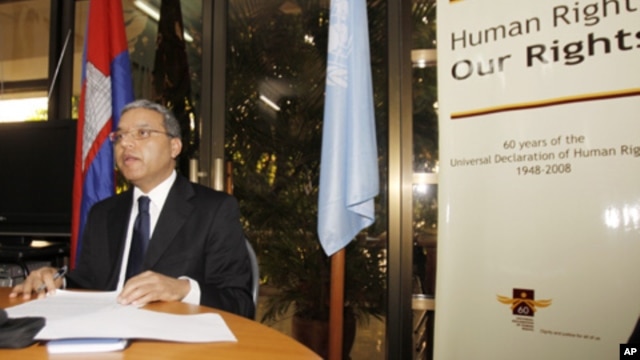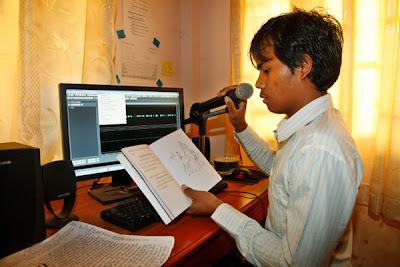Sok Khemara, VOA Khmer
31 August 2012
WASHINGTON DC - Cambodian-American voters say that as the US
presidential election approaches, they are most interested in a
president that will help them with community issues here and political
issues back in Cambodia.
Presidential candidates Barrack Obama, a Democrat, and Mitt Romney, a Republican, are in a tightly contested race for the White House, with both sides campaigning hard before the Nov. 4 election.
Schanley Kuch, a Cambodian-American from Maryland, told VOA Khmer he will vote for a candidate who can better the living standards of Americans, but will also espouse the principles of human rights and democracy that will help Cambodians back home.
“For the Cambodian people, in my view, it’s a necessary obligation to decide whether we choose economic growth in the US or think about our homeland, which is under the restoration of human rights, freedom and democracy, which needs the support of a powerful country.”
Kuong Khun, who is also from Lynne, MA, told VOA Khmer he and his family members will vote “as Americans.” He said he has a responsibility to vote for a president who will well serve the United States. But he also wants a president who “thinks about Asia, not just Cambodians, but minorities who live around the globe.”
He is undecided, he said, but will make up his mind a few weeks before Election Day.
Issues that affect Cambodians in America are similar to those the rest of the country is grappling with: economic growth, unemployment, immigration, health care and US foreign policy.
Obama is running on an incumbent platform whose basic message is that these things have improved since he came into office in 2008. Romney is challenging that, saying things have gotten worse under the current president.
Yap Kim Tung, who lives in Virginia, said he will vote for a leader that can develop the country. But he said the Cambodian-American vote will be split between the two candidates. Democratic supporters are those who lean more toward the improvement of their circumstances in the US, he said, while Republican supporters tend to be more concerned with what is happening in Cambodia.
A third group of Cambodians in America are those living in the States without citizenship, foregoing their right to vote.
Sara Pol-Lim, director of the United Cambodian Community, in Long Beach, Calif., where a majority of Cambodians live, said her organization helps some 5,000 Cambodians become citizens per year. Increasingly, Cambodian-Americans are learning the importance of political and community involvement, she said.
This year may be the best voter-turnout for Cambodian-Americans, because Los Angeles Country has begun printing election instructions and other material in Khmer, she said.
Hem Sinuon, a political advocate in Washington state, urged Cambodian-Americans to take advantage of their right to vote. Those who don’t get involved in politics, she said, are not exercising their rights to the fullest.
Presidential candidates Barrack Obama, a Democrat, and Mitt Romney, a Republican, are in a tightly contested race for the White House, with both sides campaigning hard before the Nov. 4 election.
Schanley Kuch, a Cambodian-American from Maryland, told VOA Khmer he will vote for a candidate who can better the living standards of Americans, but will also espouse the principles of human rights and democracy that will help Cambodians back home.
“For the Cambodian people, in my view, it’s a necessary obligation to decide whether we choose economic growth in the US or think about our homeland, which is under the restoration of human rights, freedom and democracy, which needs the support of a powerful country.”
Kuong Khun, who is also from Lynne, MA, told VOA Khmer he and his family members will vote “as Americans.” He said he has a responsibility to vote for a president who will well serve the United States. But he also wants a president who “thinks about Asia, not just Cambodians, but minorities who live around the globe.”
He is undecided, he said, but will make up his mind a few weeks before Election Day.
Issues that affect Cambodians in America are similar to those the rest of the country is grappling with: economic growth, unemployment, immigration, health care and US foreign policy.
Obama is running on an incumbent platform whose basic message is that these things have improved since he came into office in 2008. Romney is challenging that, saying things have gotten worse under the current president.
Yap Kim Tung, who lives in Virginia, said he will vote for a leader that can develop the country. But he said the Cambodian-American vote will be split between the two candidates. Democratic supporters are those who lean more toward the improvement of their circumstances in the US, he said, while Republican supporters tend to be more concerned with what is happening in Cambodia.
A third group of Cambodians in America are those living in the States without citizenship, foregoing their right to vote.
Sara Pol-Lim, director of the United Cambodian Community, in Long Beach, Calif., where a majority of Cambodians live, said her organization helps some 5,000 Cambodians become citizens per year. Increasingly, Cambodian-Americans are learning the importance of political and community involvement, she said.
This year may be the best voter-turnout for Cambodian-Americans, because Los Angeles Country has begun printing election instructions and other material in Khmer, she said.
Hem Sinuon, a political advocate in Washington state, urged Cambodian-Americans to take advantage of their right to vote. Those who don’t get involved in politics, she said, are not exercising their rights to the fullest.























